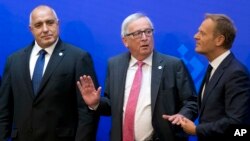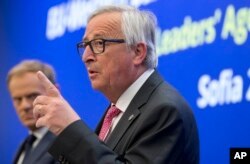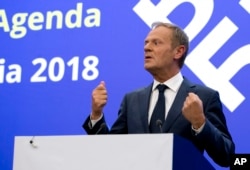European Union leaders say they are united in sticking to the Iran nuclear deal as long as Tehran abides by it. They say they will launch new measures to protect European firms doing business with Iran from U.S. sanctions. But the 28-member bloc was less unified on membership status for six Balkan nations during a special summit Thursday in Bulgaria.
The EU will launch on Friday the so-called blocking status to protect, in particular, small and mid-size companies with Iranian business interests.It will also tap the European Investment Bank to help shield them from threatened U.S. sanctions, following President Donald Trump's decision to pull out of the Iran nuclear deal.
European Commission head Jean-Claude Juncker also said the bloc is willing to discuss strengthening energy ties with the United States and changes to the World Trade Organization rules, but only after Washington makes the temporary exemptions to steel and aluminum tariffs set to expire June 1 permanent.
"We will not negotiate with the sword of Damocles hanging over our heads," said Juncker. "It is a matter of dignity and a matter of efficiency."
European frustration over the Trump administration has been growing, especially following its pullout from the Iran deal last week.It was reflected in EU chief Donald Tusk's remarks following the Sofia summit.
"I think the real geopolitical problem is not when you have an unpredictable opponent, or enemy or partner," said Tusk.
"The problem," he added, "is when your closest friend is unpredictable. It is not a joke now. This is the essence our problem today with our friends on the other side of the Atlantic."
Split over the Balkans
Even as the European Union is united over sticking to the Iran deal, the summit also highlighted the difficulties of expanding the block to include western Balkans candidates. There are a series of challenges, from the refusal by half a dozen EU nations to recognize Kosovo, to bilateral disputes and concerns over Balkans stability. EU members also need to decide in June whether to open membership talks with Macedonia and Albania.
But the Europeans are also aware of competition for influence in the Balkans, including from Russia. Some argue membership expansion will inject new vitality into the European Union, which is losing Britain with Brexit.
"I do not see another future for the western Balkans other than the EU," said Tusk. "There is no alternative, there is no plan B. The Western Balkans are an integral part of Europe and they belong to our community."
But Tusk acknowledged Balkans nations are also grappling with sizable problems. And some member states like France argue the European Union must first get its own house in order before taking on new members.






